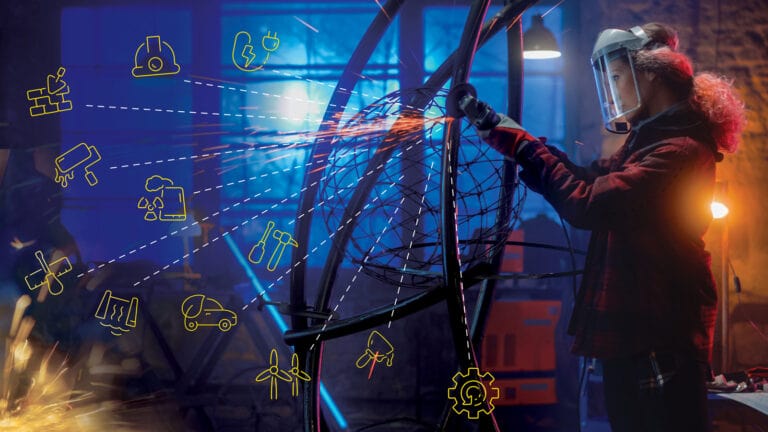The Australian labour market is substantially gender-segregated, with fewer than half of all industries maintaining a gender-balanced workforce. This is particularly common in industries like construction and mining, where women make up less than 20% of the workforce, and even less in the manual trades. Government and industry bodies have long tried to overcome skills shortages in the trades by encouraging more women to pursue these careers. But the gender imbalance remains, largely because of entrenched social expectations.
Women interested in trade apprenticeships are often discouraged by deep-rooted societal and cultural norms that view certain trades as primarily masculine roles. This problem is compounded by educational systems that, on a whole, fail to encourage and support women in these career paths. As a result, fewer girls and their families consider the manual trades as a viable career option. Recognising this, The BUSY Group has implemented various initiatives to support and empower women to succeed in trade apprenticeships. Addressing these societal and educational barriers, with the proactive involvement of organisations like BUSY, is essential for advancing gender equality in the trades sector.
Societal and Cultural Barriers
Persistent societal and cultural norms present a significant barrier for women entering trade apprenticeships. These norms, often reinforced by media, popular culture and social expectations, create a perception of trades as masculine occupations, leading to a decrease in interest among girls and their families in considering trades as a career path (Struthers & Strachan, 2019). Traditional high school education further contributes to this issue offering curriculums that result in fewer girls studying subjects like maths and science or engaging in trade-based classes. At The BUSY Schools, we tackle this issue by implementing a curriculum that adopts a non-gendered approach to education, encouraging students to consider trades without the constraints of traditional gender biases. This progressive approach by The BUSY Schools is a vital step towards dismantling these entrenched stereotypes and opening the world of trades to a more diverse future workforce.
Workplace Challenges
Women in trades frequently face a range of workplace challenges, including a higher rate of bullying, sexual harassment and gender-based discrimination (Jobs Queensland, 2021). These issues are especially acute in male-dominated industries like construction, where workplace bullying is notably high (Ross et al., 2020). Such hostile environments adversely affect the mental well-being of female apprentices. Additionally, the lack of facilities for women, such as suitable toilets and changing rooms, contributes to this discrimination and negatively impacts their continued participation in trades.
BUSY is proactively addressing these issues by establishing policies and practices aimed at fostering a respectful and inclusive workplace culture. This includes providing gender sensitivity training for employers and advocating for women in male-dominated industries.
Lack of Female Role Models
The scarcity of female role models in male-dominated trade apprenticeships presents a significant obstacle for women. This lack of representation can make it difficult for women to see themselves pursuing a career in traditionally male industries—it also makes it difficult to find mentorship from women with experience in the sector. The absence of visible role models often leaves women without the necessary guidance and inspiration they may need to pursue a career in these fields.
To bridge this gap, we established BUSY Sisters, to connect women starting apprenticeships in male-dominated trades with experienced female mentors. This program not only offers practical advice and support, it also plays a vital role in creating a network of female role models within the industry. Such efforts are essential in forging a path for future generations of women in trades, breaking down barriers and fostering more inclusive industry practices.
Resistance to Hiring Female Tradies
Another critical barrier women face in trade apprenticeships is resistance from some employers to hire female apprentices. This often stems from entrenched stereotypes and biases about women’s capabilities in trades, which can significantly limit opportunities for women to enter and thrive in these sectors.
At BUSY, we actively collaborate with industry bodies and employers to challenge these biases and promote the hiring of female apprentices. Through advocacy and education, highlighting the valuable contributions of women in trades, we aim to shift employer attitudes and open more opportunities for women in these fields.
Overcoming Gender Stereotypes
Female apprentices in male-dominated work environments often face entrenched gender stereotypes and biases. These challenges extend beyond external barriers to include internalised societal norms about gender roles. Women employ various strategies to navigate these environments, ranging from adapting to different more masculine identities to emphasising their professional and technical strengths (Wulff et al., 2021).
At BUSY, we support girls in schools and assist female apprentices in developing strategies to effectively navigate and reshape their work environments so they can be true to themselves. This comprehensive approach ensures women are not only equipped with the necessary skills but also armed with the confidence and support needed to challenge and transform traditional gender dynamics in trades.
Effectively tackling the challenges that women face in male-dominated trade apprenticeships in Australia demands a multifaceted approach. This involves societal changes, educational reform and tailored industry-specific strategies. Through mentorship, education, pre-employment training and collaboration with industry bodies and employers, BUSY is making a significant contribution to increasing female participation and success in male-dominated trades. Contact us for more information on how BUSY supports women in male-dominated trades.

